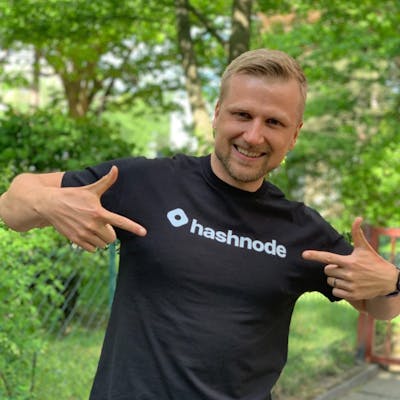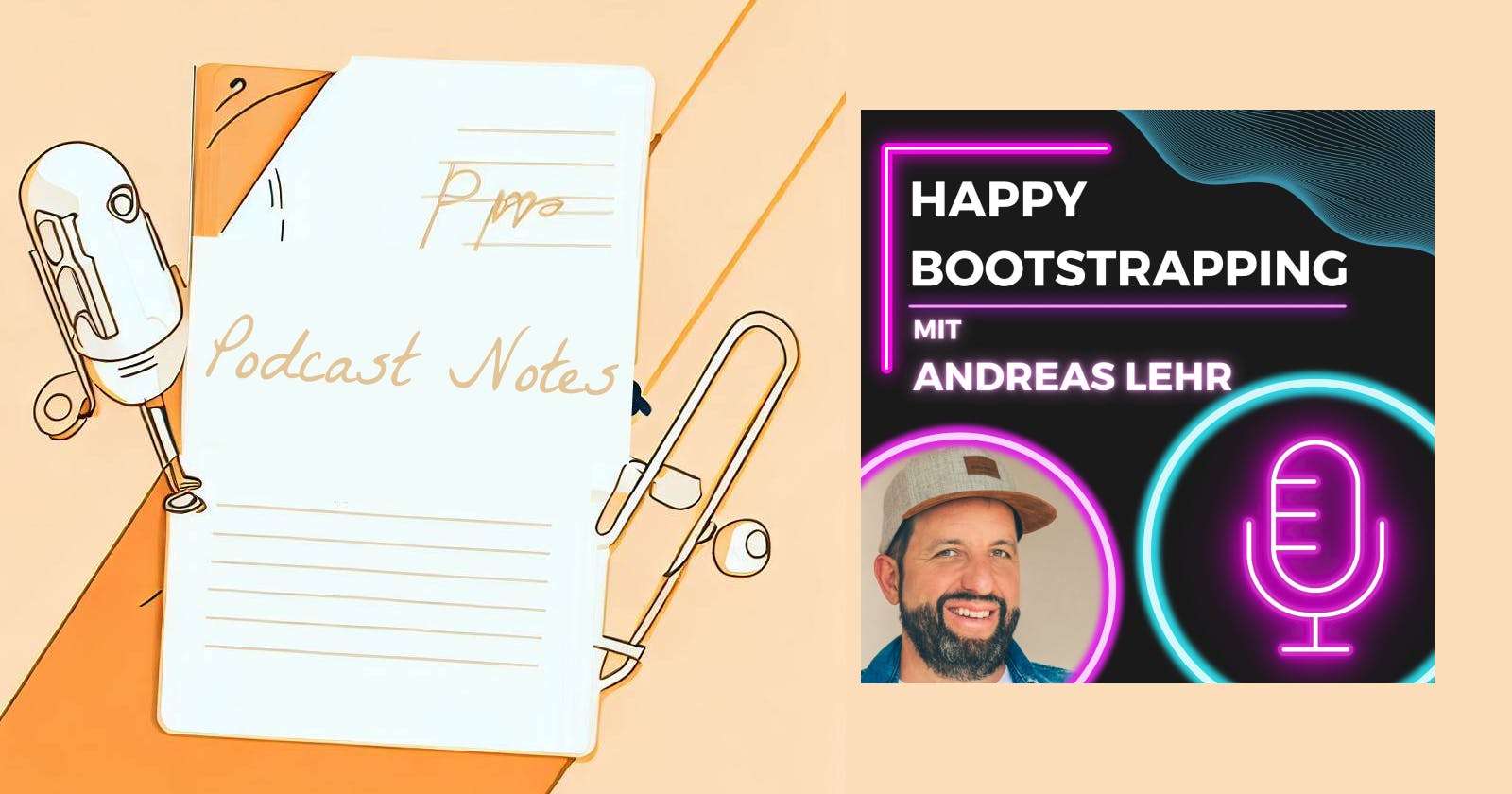Podcast Notes: Happy Bootstrapping
My podcast notes for Happy Bootstrap podcast. Inspiring interviews with founders of bootstrapped companies. Discovering their stories and business.
By Andreas Lehr (🇩🇪) who is the founder of We Manage and also runs a newsletter allesnurgecloud.
My name is Andreas Lehr and in this podcast, I interview different entrepreneurs every week about their stories.
Bootstrapping, solopreneur, and indie hacker - what does that actually mean? "Bootstrapped" companies are usually self-financed and grow from revenues without any venture capital.
In "Happy Bootstrapping," I talk with founders about the ups and downs of bootstrapping and the unique aspects of this type of business formation.
I am fascinated by the inspiring stories and the constantly changing challenges that define such a founder's life. I want to share these experiences with you and inspire you to implement your own ideas.
(Translated with Hashnode AI)
Links
Podcast on Spotify
allesnurgecloud Newsletter
My Notes
E21 – with Dominik Sobe of HelpKit.so
Several projects under Seven Degrees Labs
Mistake: building something for 2-3 months and then launch and fail
Built MVP of HelpKit.so in 2 days at a hackathon
Founded LLC in the USA (with the help of another company); tax-wise in Portugal (Lisbon)
Uses Paddle because dealing with taxes worldwide is difficult with Stripe
Stack: Nuxt on Netlify, Stripe on Render, Paddle, Postgres on DigitalOcean (bad experience with DB on Render)
At launch, find your own product bad, otherwise launched too late
Built-in public is a good idea
Open Startup is only good at the beginning; quickly encourages imitators
Uses AI to improve the core product (HelpKit AI)
Solopreneur by conviction, no co-founders or employees
Uses "Engineering as Marketing": building small tools to promote products; on the same domain
For digital nomads: stay at least 3-6 months in one place, otherwise, you won't make progress
E24 – with Markus Biel of maildroppa.com
Email tool because there were already tools and it was verified that it is a relevant market -> existing tools can verify that there is a market
MVP is very difficult; it's necessary to understand the core, the main added value precisely; Markus Biel focused on sending emails and attracted spammers
Finding employees (including freelancers): have 3 do a task/project simultaneously and continue with the best one if it fits; separate at the first sign of not getting along; maintain the relationship during collaboration
Tech stack: React, Java, Quarkus, GitLab, MariaDB (wants Postgres), Docker, Digital Ocean
As low entry barrier as possible for customers: e.g., no credit card and not verifying email right away, but only when they really want to send
Free plan with low quota but all features
Tips from others can be a good starting point, but in the end, everything/everyone is individual and the market decides: e.g., actually, you shouldn't have a free plan, but it's common in the market and competitors offer it
Gamechanger: Record videos (like Loom); not just for communication with others but also for yourself
E2 – with Philipp Glöckler of Lollipod.de
host of Doppelgänger TechTalk Podcast
Two businesses (Podcast and Podcast Ad-Platform) mutually support each other
Advantage of Corporate Job: You can make mistakes that others pay for
Little money promotes the development of creative solutions
E16 – with Michael Kamleitner of swat.io & walls.io
2 companies (swat.io & walls.io) built in the social media marketing field
swat.io started as a Social Inbox; ~45 employees; M. Kamleitner no longer operationally active
walls.io offers social media walls (e.g. trade shows, etc.); ~20 employees
walls.io prototype was coded as a surprise for a birthday party
Tech Stack: React, PHP, NodeJS, Kubernetes, MySQL and Postgres
Product emerged from customer demand (🎧 Play snip - 1min️ (19:30 - 19:52))
Companies emerged from the agency and were then spun off
"Test" products within the company but keep teams clearly separated (🎧 Play snip - 1min️ (33:31 - 34:23))
Critical dependencies ("make or break", e.g., Twitter API) should be avoided (🎧 Play snip - 1min️ (01:01:15 - 01:02:25))
As a bootstrapper, you need to find a niche to compete with VC-funded companies. Undercutting prices is often not possible (🎧 Play snip - 1min️ (01:05:43 - 01:06:40))
Advantages of bootstrapping: making your own decisions, following your own path, setting your own pace, etc.
E38 - Dividend Calendar as a SaaS Solution - Johannes Kronmüller from divvydiary.com
Biggest challenge: qualitative data; many sources and own algorithms needed (🎧 Play snip - 1min️ (32:37 - 33:57))
Selling data via API to others
Tier names are "Penny Pincher" and "Aristocrat" -> Tier names with meanings for the customer
Woman is on parental leave and plans to enter the content business (Instagram) (🎧 Play snip - 1min️ (58:17 - 59:37))
E4 – with David Pohlmann of Billbee.io
Billbee: Swiss Army knife for everything post-sale (invoices, etc.) in eCommerce (primarily) for small businesses.
Created out of personal need (tool for use with Dawanda).
Developed alongside freelance work -> gradually shifted focus from freelancing to Billbee.
Small businesses haven't brought in much revenue, but they've been useful for spreading awareness 🎧 Play snip - 1min️ (16:05 - 17:25)
Initially only organic, no paid marketing.
The biggest benefit of bootstrapping: no one to answer to; the ability to prioritize employees over profits if needed (🎧 Play snip - 1min️ (40:30 - 41:21))
Strong emphasis on employee satisfaction (30h work week).

